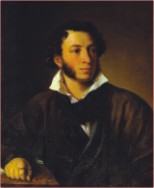Author Profile
Alexander Pushkin
 Alexander Sergeyevich Pushkin was a Russian Romantic author who is considered to be the greatest Russian poet and the founder of modern Russian literature. He is best known for his novel 'Mother'. Pushkin pioneered the use of vernacular speech in his poems and plays, creating a style of storytellingmixing drama, romance, and satireassociated with Russian literature ever since and greatly influencing later Russian writers. Alexander Sergeyevich Pushkin was a Russian Romantic author who is considered to be the greatest Russian poet and the founder of modern Russian literature. He is best known for his novel 'Mother'. Pushkin pioneered the use of vernacular speech in his poems and plays, creating a style of storytellingmixing drama, romance, and satireassociated with Russian literature ever since and greatly influencing later Russian writers.
Born in Moscow, Pushkin published his first poem at the age of fifteen, and was widely recognized by the literary establishment by the time of his graduation from the Imperial Lyceum in Tsarskoe Selo. Pushkin gradually became committed to social reform and emerged as a spokesman for literary radicals; in the early 1820s he clashed with the government, which sent him into exile in southern Russia. While under the strict surveillance of government censors and unable to travel or publish at will, he wrote his most famous play, the drama Boris Godunov, but could not publish it until years later. His novel in verse, Eugene Onegin, was published serially from 1825 to 1832.
Pushkin and his wife Natalya Goncharova, whom he married in 1831, later became regulars of court society. In 1837, while falling into greater and greater debt amidst rumours that his wife had started conducting a scandalous affair, Pushkin challenged her alleged lover, Georges d'Anthès, to a duel. Pushkin was mortally wounded and died two days later.
Because of his liberal political views and influence on generations of Russian rebels, Pushkin was portrayed by Bolsheviks as an opponent to bourgeois literature and culture and a predecessor of Soviet literature and poetry. Tsarskoe Selo was renamed after him.
In 1831, highlighting the growth of Pushkin's talent and influence and the merging of two of Russia's greatest early writers, he met Nikolai Gogol. After reading Gogol's 1831-2 volume of short stories Evenings on a Farm near Dikanka, Pushkin would support him critically and later in 1836 after starting his magazine, The Contemporary, would feature some of Gogol's most famous short stories.
Critics consider many of his works masterpieces, such as the poem The Bronze Horseman and the drama The Stone Guest, a tale of the fall of Don Juan. His poetic short drama "Mozart and Salieri" was the inspiration for Peter Shaffer's Amadeus. Pushkin himself preferred his verse novel Eugene Onegin, which he wrote over the course of his life and which, starting a tradition of great Russian novels, follows a few central characters but varies widely in tone and focus. "Onegin" is a work of such complexity that, while only about a hundred pages long, translator Vladimir Nabokov needed two full volumes of material to fully render its meaning in English. Because of this difficulty in translation, Pushkin's verse remains largely unknown to English readers. Even so, Pushkin has profoundly influenced western writers like Henry James.
Some attention has also been given to Pushkin's apparent anti-Semitism in his writings, as well as those of his contemporaries, Fyodor Dostoevsky and Nikolai Gogo.
Alexander Pushkin is usually credited with developing literary Russian.Where he found gaps in the Russian vocabulary, he devised calques. His rich vocabulary and highly sensitive style are the foundation for modern literary Russian. Alexander Pushkin played an absolutely unique role in the Russian literature. Russian literature virtually begins with Alexander Pushkin. His talent set up new records for development of the Russian language and culture. He became the father of Russian literature in 19th century, marking the highest achievements of 18th century and the beginning of literary process of 19th century. Alexander Pushkin introduced Russia to all the European literary genres as well as a great number of West European writers. He brought natural speech and foreign influences to create modern poetic Russian.His use of Russian language formed the basis of the style of novelists Ivan Turgenev, Ivan Goncharov, and Leo Tolstoy. Pushkin was recognized by Nikolay Vasilyevich Gogol, his successor and pupil, the great Russian critic Vissarion Grigoryevich Belinsky, who produced the fullest and deepest critical study of Pushkin's work, which still retains much of its relevance. Alexander Pushkin became an inseparable part of the literary world of the Russian people. Translated into all the major languages, his works are regarded both as expressing most completely Russian national consciousness and as transcending national barriers. Pushkin's intelligence, sharpness of his opinion, his devotion to poetry, realistic thinking and incredible historical and political intuition make him one of the greatest Russian national geniuses.
Source : Wikipedia
|
